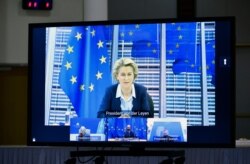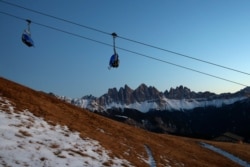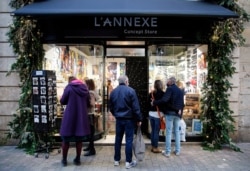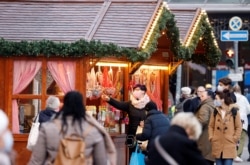All Europeans want is a merry and bright Christmas season, just like the ones they used to know. And under public pressure some governments are easing their pandemic restrictions in a bid to salvage something of the holiday spirit.
But as some governments plan to soften restrictions by increasing the number of separate households permitted to socialize and allowing people to travel, others are still grappling with how far they should go in easing lockdowns or lifting curfews, fearing that having a merry Christmas will likely mean suffering a miserable new year.
Scientists across the continent, which already accounts for a quarter of the world’s coronavirus cases and deaths from COVID-19, the disease triggered by the virus, are warning of a doubling in infection rates, if the regime for the holiday is too liberal.
European Commission President Ursula von der Leyen last week said it was important for European states to coordinate any easing of pandemic restrictions. “We will make a proposal for a gradual and coordinated approach to lifting containment measures. This will be very important to avoid the risk of yet another wave,” von der Leyen said.
Despite her call for coordinated action, national governments are making up their own minds without synchronizing approaches — as they have ever since the pandemic first struck the continent earlier this year. Many European governments say they have little choice but to ease pandemic restrictions, fearing that if they maintain stringent rules, their citizens will only ignore them. People who have elderly relatives with not many Christmases left to enjoy are unlikely to heed warnings to observe tight restraints, officials worry.
As a result, some countries that have tight pandemic restrictions in place are planning to abandon them for a few days at least, including “whack-a-mole” strategies aimed at suppressing local outbreaks of contagion. They include England. Others, like Italy, though, are still struggling to decide.
A patchwork of strategies is emerging. Take ski resorts for example. Italy’s prime minister, Giuseppe Conte, has said Italian resorts should remain closed over Christmas and the New Year holiday. Italian officials say he’s mindful that earlier this year, when the pandemic first appeared, the ski resorts in the Tyrol region in northern Italy and western Austria acted as super-spreaders. More than an estimated 6,000 people, from 45 countries, who contracted the coronavirus in March, either went on vacation in the Tyrol or came into contact with someone who did.
Ski resorts and overseas vacations
German Chancellor Angela Merkel wants all resorts across Europe closed during Christmas. That, though, is something Austria and Switzerland are not prepared to do. Both countries are desperate for the resorts to generate some income and have said cable cars, restaurants and bars will operate, but with social distancing rules in place and mask-wearing required.
“When someone uses a lift, it is similar to when they use public transport,” Sebastian Kurz, the Austrian chancellor, said last week. France, too, is planning to allow ski resorts to operate but without the use of lifts or cable cars. Some countries, including Germany, will require any of their citizens or residents returning from vacations abroad to quarantine for at least 10 days.
Aside from ski resorts and overseas vacations, European countries are also trying to balance contradictory demands. They want to stem the spread of the virus but limit the economic fallout. The nations are also fearful of widespread non-compliance if they are too strict.
Christmas and New Year's restrictions
France is easing coronavirus lockdown rules incrementally ahead of the holiday. On Saturday, small businesses were allowed to reopen and places of worship permitted to hold services for up to 30 people. The French, who were required to stay within a kilometer of their homes, are now allowed to travel up to 20 kilometers away from their residences.
After December 15, the current broad lockdown will be lifted, but a curfew will remain in place between 9 p.m. and 7 a.m. local time except on Christmas Eve and New Year's Eve. Unhindered travel will be permitted, allowing people to spend Christmas with family, but restaurants, bars and gyms won’t be allowed to reopen until January 20, and then only if the epidemic remains contained.
“I call upon your sense of responsibility,” French President Emmanuel Macron said in a nationwide broadcast last week. “This will certainly not be a Christmas like the others,” he warned, urging the French to wear masks and wash their hands.
The Spanish government is yet to finalize Christmas plans. But Madrid is likely to impose a limit of six people at parties. It is encouraging all social gatherings in the run-up to the holiday to be held outside. Traditionally Spain celebrates the Feast of the Three Kings, marked by local parades on January 5, but the government has said the celebrations should not go ahead this time.
In Italy, Conte, his ministers and regional heads of government have been debating what to allow and what to restrict, including whether midnight church services can go ahead. The country’s contagion rate has slowed in some regions but in others, transmission rates are alarming and Italy's death toll is as high as the country experienced in the first wave of the pandemic in March and April.
Many restrictions are likely to remain in place in Italy and what rule easing that will be seen will be less than during Italy’s summer. “It will be a different kind of Christmas; sacrifices are still necessary in order not to expose ourselves to a third wave in January with a high number of deaths,” Conte cautioned Italians. Final decisions on Christmas rules will be issued later this week.
Germany is to continue with its current strategy dubbed “lockdown light.” Bars, restaurants and entertainment venues are likely to remain shuttered and travel discouraged. “Daily cases are still far too high, and our intensive care units are still very full,” according to Chancellor Merkel. But she has approved a temporary reprieve over Christmas with up to 10 people allowed to meet at a time between December 23 and New Year’s Day.
British Prime Minister Boris Johnson’s government has decided to ease some pandemic rules in England, although privately ministers acknowledge that will prompt another surge of new cases, just as the country’s lockdown has been slowing the rate of infections. The government’s scientific advisory panel has warned the relaxation of coronavirus restrictions over Christmas will increase infections “potentially by a large amount.”
In a document published last week, the panel said, “Substantial mixing of people over a short period of time, especially those who do not make contact regularly…represents a significant risk for widespread transmission.” “The prevalence could easily double during a few days of festive season,” it added.
All four nations of the United Kingdom, England, Scotland, Wales and Northern Ireland, are planning to try to coordinate Christmas coronavirus rules and are intending to relax some over the holiday season. In England, people will be allowed to celebrate in three-household “Christmas bubbles” for a five-day period over the season; but, those households cannot meet up inside pubs, hotels, stores, theaters or restaurants.
Restrictions on church services are due to be lifted, allowing Christmas services. Last week, Prime Minister Johnson told lawmakers, “I can't say that Christmas will be normal this year — but in a period of adversity, time spent with loved ones is even more precious for people of all faiths and none.”
Some British Cabinet ministers are pressing for more easing — so, too, are backbench lawmakers from Johnson’s ruling Conservative party. Local government minister Robert Jenrick acknowledges the softening of restrictions will likely “drive some higher rate of infection.” Nonetheless he’s pushing for stores to remain open 24 hours a day in the run-up to Christmas, if they so wish.









